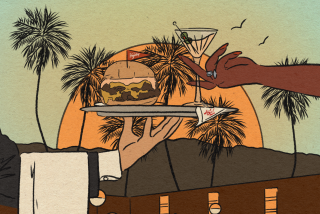Tax junk food: Fight obesity one penny at a time
Let’s call it what it is: a sin tax.
A California lawmaker is targeting the obesity epidemic with a tax that would slap a penny-an-ounce levy on drinks sweetened with sugar or corn syrup.
The food industry, not surprisingly, has squared off against the idea, arguing that the tax bill is a punitive assault on personal choice.
“The government doesn’t have the right to social engineer,” said J. Justin Wilson, senior research analyst at the industry-backed Center for Consumer Freedom. “It doesn’t have a right to protect us from ourselves.”
No? The food folk are correct that this is a way of punishing people for unhealthy behavior. But they’re wrong when they say the government has no role to play in prodding people to do better.
The other prominent sin taxes out there, for tobacco and alcohol, raise money for health and education programs, and that’s a good thing. But their main purpose is to make these products more expensive and thus less attractive to potential users.
Considering that about two-thirds of American adults and a third of our kids are now overweight or obese, it seems more than reasonable to extend the same thinking to sugary drinks, which researchers say are a key contributor to the obesity epidemic.
That said, soda isn’t the sole culprit. If we’re serious about shedding all those excess pounds, it’ll take more than just making Coke and Pepsi more expensive. More on that in a moment.
First, let’s take a closer look at AB 669, the legislation introduced last week by Assemblyman William Monning (D-Carmel). He serves as chairman of the Assembly Health Committee.
The bill would levy an excise tax of 1 cent per ounce on any beverage with caloric sweeteners such as sugar and high-fructose corn syrup. These beverages include sodas, energy drinks and sports drinks.
The estimated $1.7 billion raised by the tax annually would be dedicated exclusively to funding physical fitness and childhood obesity programs statewide that are now facing cuts because of California’s ongoing budget woes.
The money would go toward activities and gear at schools and nonprofit organizations intended to get kids off their keisters — sports, games, play equipment. It would go toward providing more-healthful lunch choices and efforts to educate kids about eating right.
That won’t do the whole job, of course. Parents also have some heavy lifting to do by making smarter choices at the grocery store and drive-through window. But it’s better than doing nothing as kids scarf junk food and plop in front of the TV.
“These beverages have zero nutritional value, and the advertising that targets children is massive,” Monning told me.
He rejected the food industry’s claim that government has no role to play in influencing people’s behavior.
“What we’re trying to respond to is the social engineering that corporate advertising does every day,” Monning said. “That’s the real social engineering.”
He said the impact of beverage marketing is most profound in lower-income and minority communities, where studies show that soda is frequently consumed on a daily basis and as a routine part of meals.
One recent study found that adult obesity rates for blacks and Latinos is higher than for whites in nearly every state.
The adult obesity rate for blacks is at least 30% in 43 states and the District of Columbia, according to the Trust for America’s Health and the Robert Wood Johnson Foundation. The adult obesity rate for Latinos is at least 30% in 19 states. Only one state, West Virginia, has an adult obesity rate for whites greater than 30%.
“This is a public health response to a public health epidemic,” Monning said of his bill.
Wilson of the Center for Consumer Freedom, which is funded primarily by the food industry, countered that people have a right to drink unhealthful beverages if that’s their choice. “Soda is not a problem,” he said. “It’s a simple pleasure.”
The real problem, Wilson said, is “overconsumption of calories,” and soda accounts for less than 10% of the average person’s daily calorie intake.
That may be true, responded Harold Goldstein, executive director of the California Center for Public Health Advocacy, but the calories from soda constitute a significant portion of the extra, unneeded amount that makes people fat.
A 2009 report by UC Berkeley’s Center for Weight and Health found that from the 1970s to 2000, the average person’s daily food consumption increased by 300 calories. Of that amount, “the increase in calorie consumption from sweetened beverages is equivalent to 43% of the total increase in calorie consumption,” the report found.
“It’s the equivalent of drinking a piece of chocolate cake any time you’re thirsty,” Goldstein said.
So making soda more expensive, and devoting the additional revenue to anti-obesity efforts, makes a lot of sense both socially and economically — just as we’ve seen for tobacco and alcohol. But it’s not the whole answer.
The food industry and health advocates agree that what’s needed is significant change in people’s behavior. Put simply, we need to eat less and exercise more.
Personal responsibility is important. But if that alone were sufficient to keep us fit and trim, we wouldn’t be a nation of porkers and porkers-in-waiting.
That’s why I’d take Monning’s soda tax and expand it to fast food — say, a penny for every 500 calories served.
A 540-calorie Big Mac at McDonald’s would net an extra penny. So would a 500-calorie large order of fries. A 32-ounce chocolate Triple Thick Shake, at 1,160 calories, would bring in two cents.
Factor in all the other stuff bought every day at all fast-food chains, and you can see we’d be talking about some serious money. That money in turn would be used for creation of bike paths, basketball courts and other fitness-related resources.
It could also be used to help subsidize gym memberships (which health insurers should do as well, if they really want to cut their long-term costs).
The food industry is right: A soda tax won’t solve the obesity epidemic. Sin taxes in general aren’t going to make problems go away.
But they’re a good place to start.
David Lazarus’ column runs Tuesdays and Fridays. He also can be seen daily on KTLA-TV Channel 5. Send your tips or feedback to david.lazarus@latimes.com.
More to Read
Eat your way across L.A.
Get our weekly Tasting Notes newsletter for reviews, news and more.
You may occasionally receive promotional content from the Los Angeles Times.







